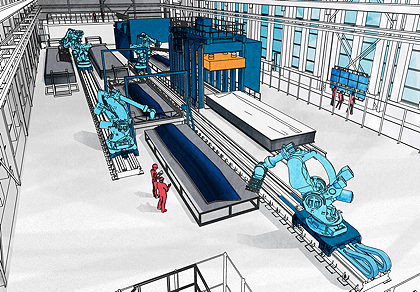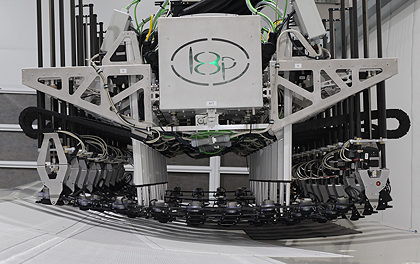The three Fanuc M-2000iA/1700L robots – claimed to be the world’s most powerful long-reach robot – have been ordered by a consortium that includes Boeing, Loop Technology, Spirit AeroSystems and the AMRC. The six-axis machines will be delivered to the AMRC innovation facility, which is part of the larger Project Compass (Composites at Speed and Scale) initiative. Two further FANUC M-2000iA robots – 1200L and 900L models – will also be installed as part of this project.
In a separate project, another 1700L model, as well as an additional 900L machine, have been ordered by Loop Technology to form part of a high-rate composite preforming cell for a North American aerospace customer. This brings the total number of Fanuc six-axis robots commissioned by Loop Technology as part of this order to seven.
The Sheffield AMRC facility aims to de-risk and develop high-rate sustainable structures, with the potential to cut the time needed to process large composite components from around 40 hours to about four. The facility is expected to be ready by the end of 2024.
It will be home to a raft of state-of-the-art equipment secured through a £29.5m grant from the Aerospace Technology Institute (ATI) programme to support new capabilities, technologies and processes to cut costs, waste, production time and carbon emissions.
The five Fanuc M-2000iA industrial robots at the AMRC facility will form part of Loop’s FibreLine high-rate deposition cell. This high-rate preform manufacturing system can pick composite sheets (plies) and form them into complex 3D double-curvature profiles, before placing them onto a tool, inspecting them and heat staking them ready for the next stage of the production process, at a rate of up to 200kg an hour. Traditional methods typically handle 40kg/h.
The National Composites Centre is using a different configuration of FibreLine that, it says, is on track to handle 350kg/h.
The two robots that Loop has ordered for the North American customer will form part of 20m-long FibreLine system being used for R&D. The system will centre around FibreForm, a 3D double-curvature preforming gripper that weighs more than a tonne, making heavy-duty industrial robots with high payload capacities and long reaches essential. The M-2000iA/1700L robots have a 1.7-tonne payload capacity and 6.2m strokes and can lift and position entire car bodies.

Four of the world’s most powerful robots will play key roles in the composite innovation facility being built at the University of Sheffield’s AMRC
“Being aero structures, the parts that are being manufactured on our FibreLine systems are extremely large,” explains Loop Technology MD, Alun Reece. “These two projects therefore both require robots with high payload and reach capabilities to access all the areas necessary in order to carry out deposition or inspection activities. While we could have used precision gantries to deploy our end-effectors, they limit access to the cell area due to requiring two rails on which to carry the gantry bridge. In contrast, the M-2000iA robots are mounted on a single axis rail, providing clear access from one side. They are our clear robot of choice for such projects.
“Innovations in robotics around scale, precision and collaborative working are opening up new opportunities for aerospace manufacturers all the time,” Reece adds. “Whether in high-rate preforming systems, fibre placement, or assembly operations such as drilling, fastening, sealing or automated inspection applications, the versatility offered by modern robotics is redefining the way tasks are performed, helping to drive down aerospace manufacturing costs while driving up quality.”
Loop Technology: X LinkedIn Facebook

Loop Technology’s FibreLine preform manufacturing system can process up to 350kg of aerospace composites per hour

